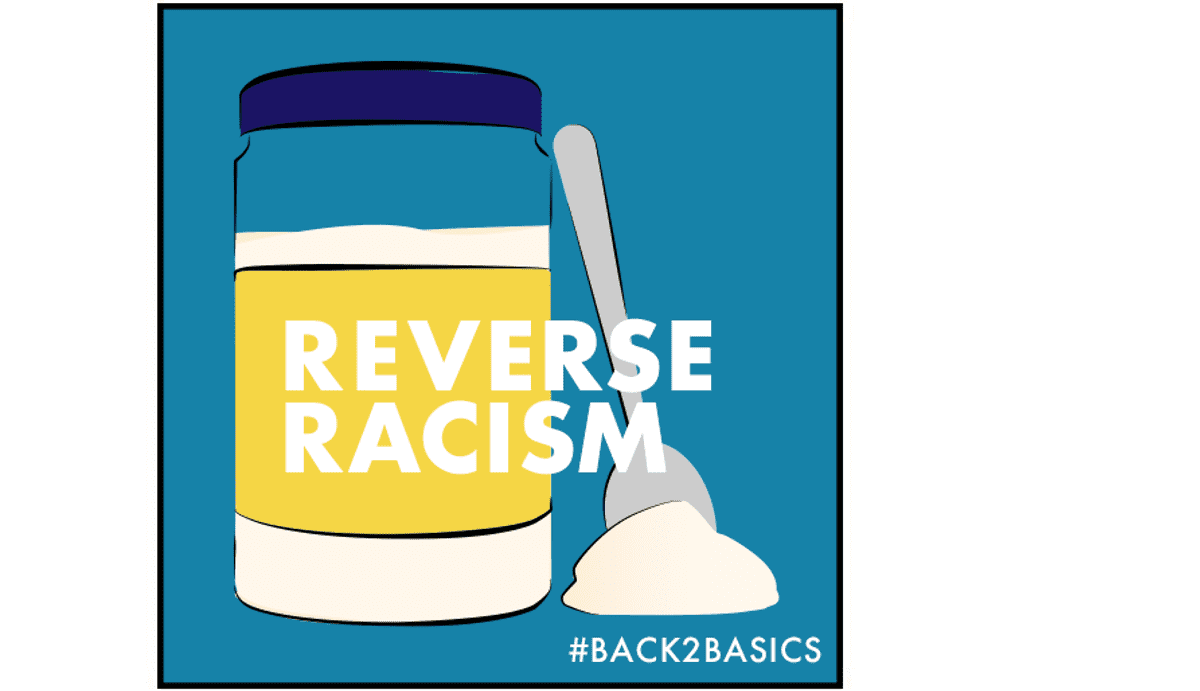Reverse Racism™: brought to you by the makers of ‘Not All White People’ and ‘How Come It’s Okay When THEY Say It?’ Reverse racism is a non-term that typifies the linguistic gymnastics that those in a position of privilege (read: white folk) regularly perform in their efforts to disregard and neutralise accusations of racism. It speaks to the pathological need for white people to be involved in literally everything, good or bad. The term is most often used to call out discrimination against white people. Reverse Racism is typically used to describe one of two situations:
- When a white person is called a cracker, or told that they can’t dance, etc.
- In protest to affirmative action schemes or initiatives like Black History Month (see: “but why is there no white history month?”)
If you are confused by where ‘reverse’ comes into this, then you probably missed that very important meeting during which we all agreed that for something to be racist, it must come from someone or an institution in a position of power. Previously, back when we had more time and you had longer attention spans, we would have categorised this as ‘systemic racism’, ‘institutional racism’ or ‘white supremacy’, but we’re living in a post-nuance world and you’ve got to get that stuff down to 140 characters or less. Enough think-pieces have been devoted to addressing whether you can be racist to white people, so we won’t cover that here, and that argument misses the point entirely anyway. The uncomfortable truth is: not all discrimination is equal. When a black person is called a thug, it means their chances of employment are significantly affected. When a white person is called mayonnaise, they are mildly embarrassed (or disproportionately outraged for some reason). Sure, both of these are instances of discrimination, but fortunately/unfortunately mayonnaise isn’t backed by the power of the prison industrial complex or racist hiring practices. Without the weight of institutional power behind you, it is pretty clear that calling someone a thug is not comparable to referring to someone as a condiment. And if your biggest concern these days is that one TV show out of a thousand doesn’t centre people who look like you, then you are probably doing okay. Cries of reverse racism most commonly crop up when ‘positive discrimination’ schemes that exclude white people are introduced. As chants of ‘You Will Not Replace Us’ from Nazis in Charlottesville (who, granted, take the performance of whiteness to an extreme) demonstrate, for some white folk, any suggestion that they should step aside and make space for those who have been historically disenfranchised is perceived as an attack. When that sense of hostility is combined with the misguided belief that we live in a meritocracy, it is easy to ignore the hundreds of years of institutionalised racism that make these types of schemes necessary. Above all else, the term ‘reverse racism’ is dumb as hell. If you want to call a show like ‘Black-ish’ or ‘Dear White People’ offensive, then you should just come out and say it. Calling it ‘reverse racism’ begs for a comparison, which should lead any sensible person to come to the conclusion that these instances are never as bad as the actual racism that people of colour regularly face. TL;DR: There is no such thing as reverse racism. The scenarios that the term is used to describe are either: not racist or too petty for anyone to care about. Check out these articles for more on the topic: http://www.huffingtonpost.com/entry/reverse-racism-isnt-a-thing_us_55d60a91e4b07addcb45da97 http://www.salon.com/2016/10/05/luke-cage-and-the-racial-empathy-gap-why-do-they-talk-about-being-black-all-the-time/ https://www.bustle.com/p/reverse-racism-what-actually-happens-when-you-insist-that-it-exists-66950 https://www.thenation.com/article/how-diversity-destroyed-affirmative-action/ Back to Basics is a Skin Deep project aiming to redefine and reevaluate words or expressions that we hear regularly in our daily lives and in the media, that are often decontextualized and poorly defined. We want to give different, and hopefully clearer, perspectives on what these terms mean, to provide you over time with a little handbook of quick and shareable definitions for when you need them most.



